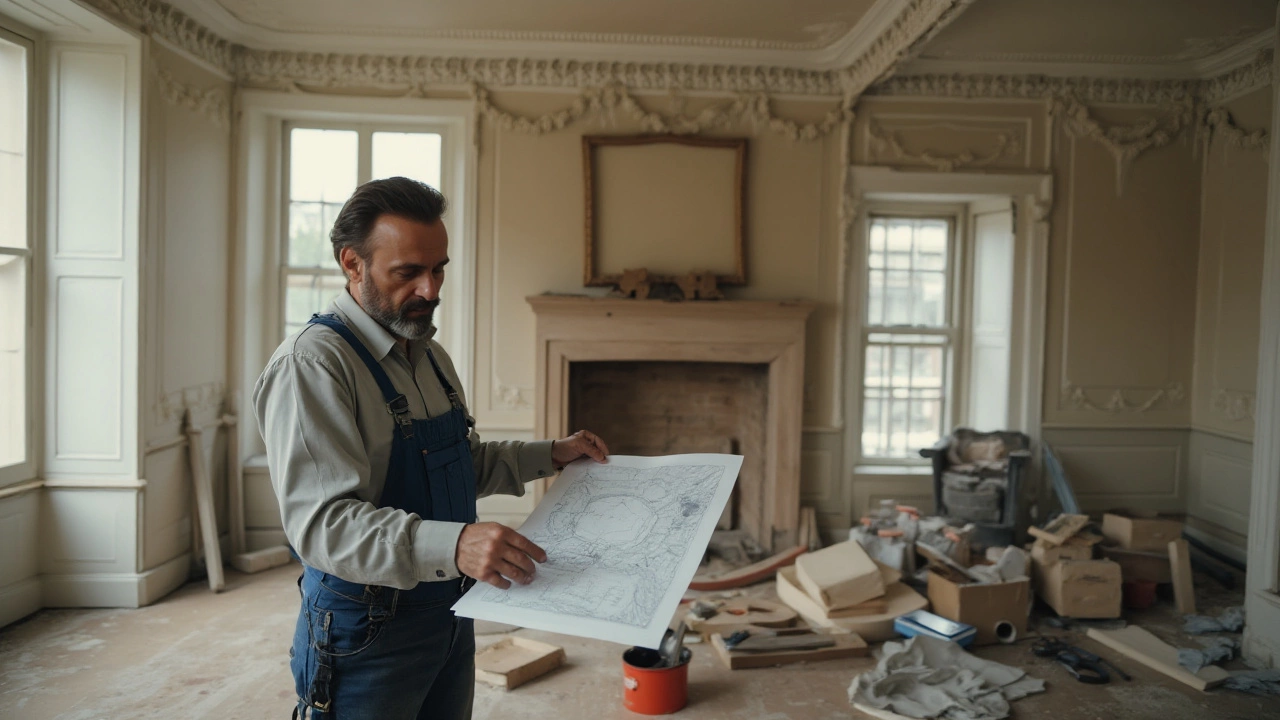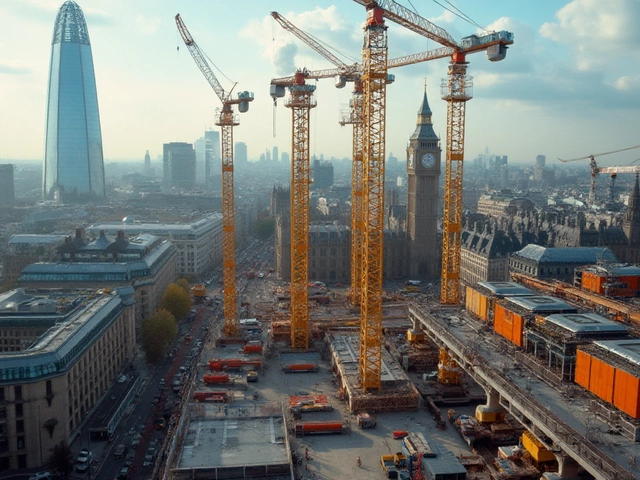Finding Professional Building Contractors in Your Area

Embarking on a building project is an exciting yet daunting adventure. One of the most crucial steps is finding the right contractor, someone who can transform your dreams into reality. But how do you select a trustworthy professional who will meet your needs and exceed your expectations?
Many people start by asking friends, family, or neighbors who have recently completed similar projects. Personal recommendations carry a lot of weight because they come from those you trust. But don’t stop there; delve deeper by checking their credentials and looking at previous work to ensure they are skilled and reliable.
In the digital age, online reviews are just a click away. These reviews can provide insights into the contractor's work ethic and quality, but remember, not all reviews are created equal, so approach them with an open mind.
- Getting Recommendations
- Checking Credentials and Experience
- Understanding Quotes and Estimates
- Evaluating Communication and Professionalism
Getting Recommendations
One of the most reliable ways to find a reputable contractor in your area is by tapping into your social circle. Talk to friends, family, and colleagues who have recently undertaken building projects. Their firsthand experiences can provide a wealth of information that is often more valuable than any online review. When seeking recommendations, inquire about the quality of the work, the contractor's professionalism, and how well they stuck to the timeline and budget. Knowing someone who has had a positive experience with a contractor can significantly reduce the risks involved in your own project.
When receiving recommendations, it's important to ask detailed questions. For instance, was the contractor punctual and did they communicate any delays effectively? Delve into specifics about the workmanship too. A solid structure is paramount, but so is the attention to finishing touches that give a project its polish. Sometimes, a small oversight can lead to larger issues down the line, so ensure the contractor showed meticulous attention to detail. It's also wise to ask if the contractor cleaned up after the job and if they were polite and courteous while on-site.
Understanding the dynamics of how contractors work with past clients is essential. Often, people assume that all contractors operate similarly, but there can be significant differences in approaches. A well-recommended contractor is likely to have built good rapport with past clients. As a matter of fact, according to a study from the Journal of Construction Management and Economics, "strong relationships and good communication between contractors and clients can improve project delivery outcomes by over 20%." This highlights the importance of contractors who not only perform well but also build strong client relationships.
In addition to personal recommendations, another effective way to expand your shortlist of potential contractors is by contacting real estate agents or property managers. These industry professionals often work with various local contractors and have insights drawn from numerous interactions. Their unique position allows them to know which contractors consistently deliver quality work and those who might be best avoided. It's a small window into the professional web surrounding property transactions and renovations, which could bridge the gap between your expectations and optimal contractor selection.
Because transparency is key, don't hesitate to ask for references from the contractors themselves if you're intrigued by one or more recommendations. A responsible contractor will be prepared and willing to provide contact details for previous clients who can vouch for their services. Speaking with these references can add an extra layer of assurance, allowing you to make an informed decision. Remember, this is a significant investment, and taking the time to perform thorough research is crucial to ensuring that your project is in good hands.

Checking Credentials and Experience
When it comes to selecting a building contractor, one cannot overstate the importance of checking credentials and experience. This stage is pivotal in ensuring that the contractor you choose is not only skilled but also trustworthy and capable. Credentials serve as a testament to a contractor’s formal training and legitimacy within the industry. One should inquire about their licenses and certifications, as these documents confirm that the contractor has met certain professional standards. A licensed contractor is also more likely to be insured, which adds a layer of protection for you as a client.
Experience, meanwhile, is the practical counterpart to credentials. A seasoned contractor brings a wealth of real-world knowledge to your project, often resulting in a more streamlined process and a superior final product. Don't hesitate to ask potential contractors how many years they’ve been in business and the types of projects they specialize in. Reviewing their past work can provide valuable insights into their capabilities. Consider visiting past jobs or asking for photographic evidence of their work.
While credentials and experience are essential, they aren't the only factors to weigh. Consistency and reliability over time can be a better indicator of a contractor's true nature. Checking references from previous clients can yield honest feedback.
As the New Zealand Certified Builders Association states, "A good builder will stand the test of time with his or her clients." This insight highlights the importance of personal testimonials, adding a qualitative measure to your assessment.For those inclined to dig deeper, consider utilizing professional associations and directories. These resources often require members to uphold strict codes of conduct and verify qualifications. Websites like the Master Builders Association offer lists of local contractors who have been vetted for quality and trustworthiness. With a plethora of information at your fingertips, take the time to verify claims and cross-reference details for peace of mind.
Factor Importance Licenses Confirm legal ability to operate Insurance Protects you in case of accidents Portfolio Shows range and quality of work Lastly, it's crucial to approach this process with patience. Take ample time to research and compare, as hasty decisions may lead to undesirable outcomes. Keep in mind that clarity and transparency in this phase can make or break the success of your entire project.

Understanding Quotes and Estimates
Securing quotes and estimates from potential building contractors is a critical step in selecting the right professional for your project. Often overlooked, this phase involves much more than simply comparing numbers. A quote provides an estimated cost for completing the work, but the devil is in the details. When gathering quotes, ensure they include a comprehensive breakdown of materials, labor, permits, and any other fees that might arise. This will not only help avoid unexpected costs but also reveal how different contractors envision the scope of your project.
When evaluating quotes, it's important to remember that the lowest bid is not always the best choice. Often, a significantly lower quote could indicate that a contractor is cutting corners or using substandard materials. Conversely, a high quote may include features or services you might not need. Striking the right balance requires a keen eye for detail and a clear understanding of your requirements. Make sure the contractor specifies the quality and brand of materials they plan to use, as this will affect both the cost and the outcome of your project.
Another crucial aspect to consider is the time frame attached to each quote. An experienced local contractor will provide a realistic timeline, accounting for any potential delays caused by weather or supply chain issues. It's worth having a discussion about how unforeseen circumstances, such as contractor illness or material shortages, will be handled. A derogatory timeline might hint at a contractor’s overcommitment or poor project management skills, both of which could be red flags.
Comparing Quotes Fairly
To compare quotes fairly, draw up an ordered list of your must-haves and nice-to-haves before you start. This can be a structured method for evaluating each proposal consistently and objectively. Watch out for discrepancies in methodology. Imagine starting with five quotes; begin eliminating based on consistent shortfalls or unexplained parameters. Once you narrow it down to two or three finalists, get clarification on any discrepancies directly from the contractor. Transparency in communication is often an indicator of a reputable reputable contractor.According to a study highlighted by Building.co.nz, nearly 60% of costly conflicts arise from misunderstandings related to quotes and estimates, emphasizing the need for proactive clarity. Proposals that offer scant information or gloss over the project's complexities should raise immediate alarms. Through the lens of experience, ask about how changes or additions will be handled financially. Remember, not all aspects of the project may be foreseeable at the estimation stage.
Homes & Gardens expert, Bob Vila once wisely noted, "A well-detailed quote tells me one thing for sure: The contractor took the time to think about the project, and that's a good sign." When a contractor provides an in-depth proposal, it demonstrates their commitment to transparency and their investment in customer satisfaction.One suggestion is to request a face-to-face review of the quotes with the contractor. This approach helps establish rapport while allowing you to verify the contractor's comprehension of your project specifics. Securing reputable contractors' proposals alongside realistic estimates will undeniably set a solid foundation for your future building endeavor.
Evaluating Communication and Professionalism
When you're searching for a reputable contractor, communication can make or break the experience. From the first contact, observe how the contractor communicates. Are they responsive to your inquiries, willing to explain their processes, and open to discussing your needs? A professional contractor respects your time by offering timely replies. During your initial interaction, notice their willingness to engage with your ideas. This will give you a glimpse into how they might handle future conversations throughout the project. A good contractor is a partner who values your input and understands the importance of clear dialogue.
Communication is not just about talking but listening, too. Your contractor should attentively listen to your concerns and goals, ensuring they align with the project's scope. This attention to detail helps in tailoring the project to meet your needs specifically. Pay attention to how they answer questions and whether they provide concrete examples from past projects or rely on vague assertions. A knowledgeable contractor can reference previous work to illustrate how they tackled similar challenges.
“The art of communication is the language of leadership,” said James Humes, author and former presidential speechwriter.Professionalism extends beyond communication. Examine the contractor’s approach to project management and organization. Are they punctual, methodical in their planning, and transparent about timelines? These factors can significantly influence the project's cost efficiencies and progress. Observe how they handle any initial paperwork or contracts. Is there clarity in the documentation, and do they provide detailed terms? Carefully prepared contracts are a hallmark of professional practice and protect both parties involved.
If you're pursuing a larger project, consistency in communication often denotes reliability. Reputable contractors often employ advanced project management tools to keep track of timelines and resources. If applicable, ask the contractor about their team structure and how they manage their workforce, as these elements are critical. Orchestrating a team requires leadership skills to ensure everyone is on the same page, aiming for excellence. A contractor who knows the strengths of their team can deliver high-quality results.
Another often overlooked aspect of professionalism is how the contractor represents themselves and their business. Observe if they present themselves well during meetings and whether their branding, such as websites or brochures, appears professional. A contractor who invests in their own image likely invests in their craft as well. This attention to detail can translate into a smoother execution of your building project.
Lastly, professional contractors provide a post-project strategy. Whether it’s a follow-up visit to check their work or offering warranties on parts of the build, look for someone who goes beyond completion to ensure satisfaction. This extended care demonstrates a commitment to their work and clients. Searching for this level of detail might take time, but those who value professionalism and solid communication will find the investment worthwhile.

